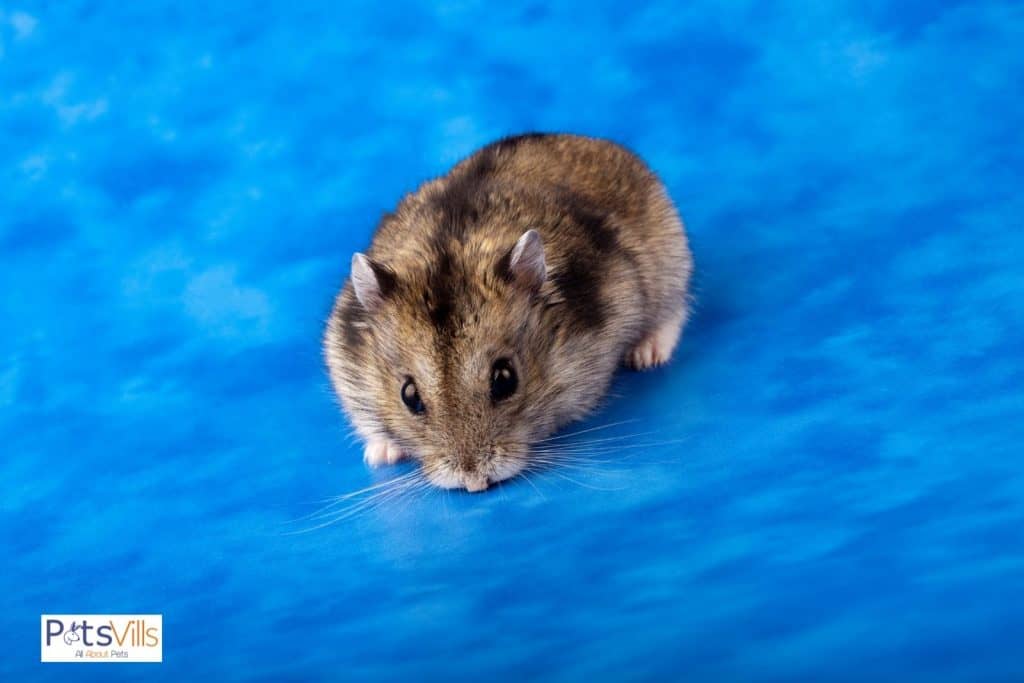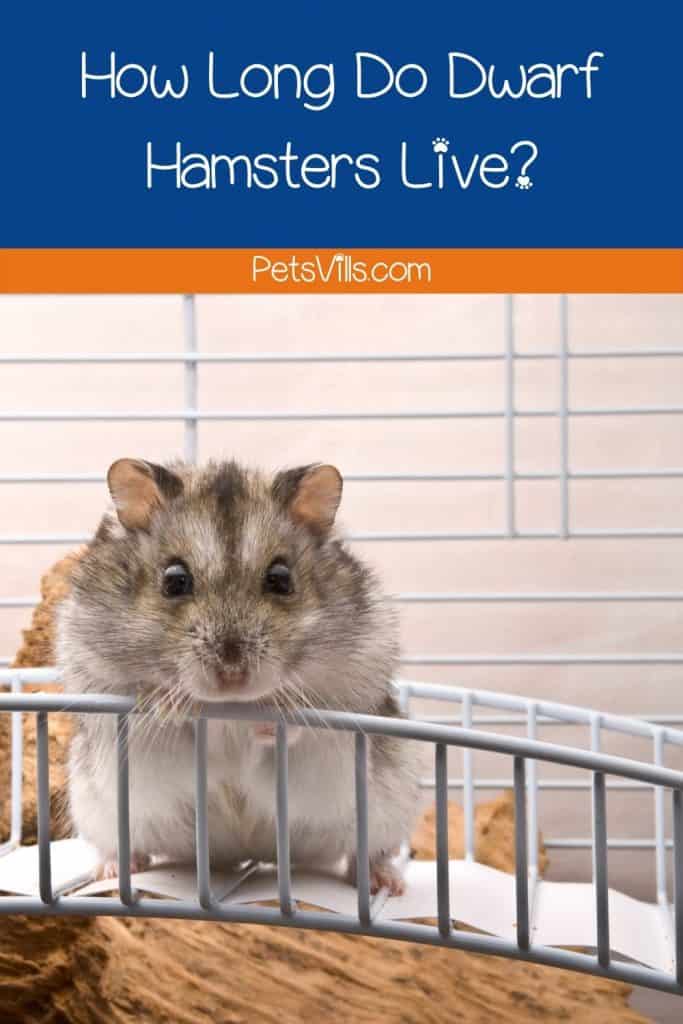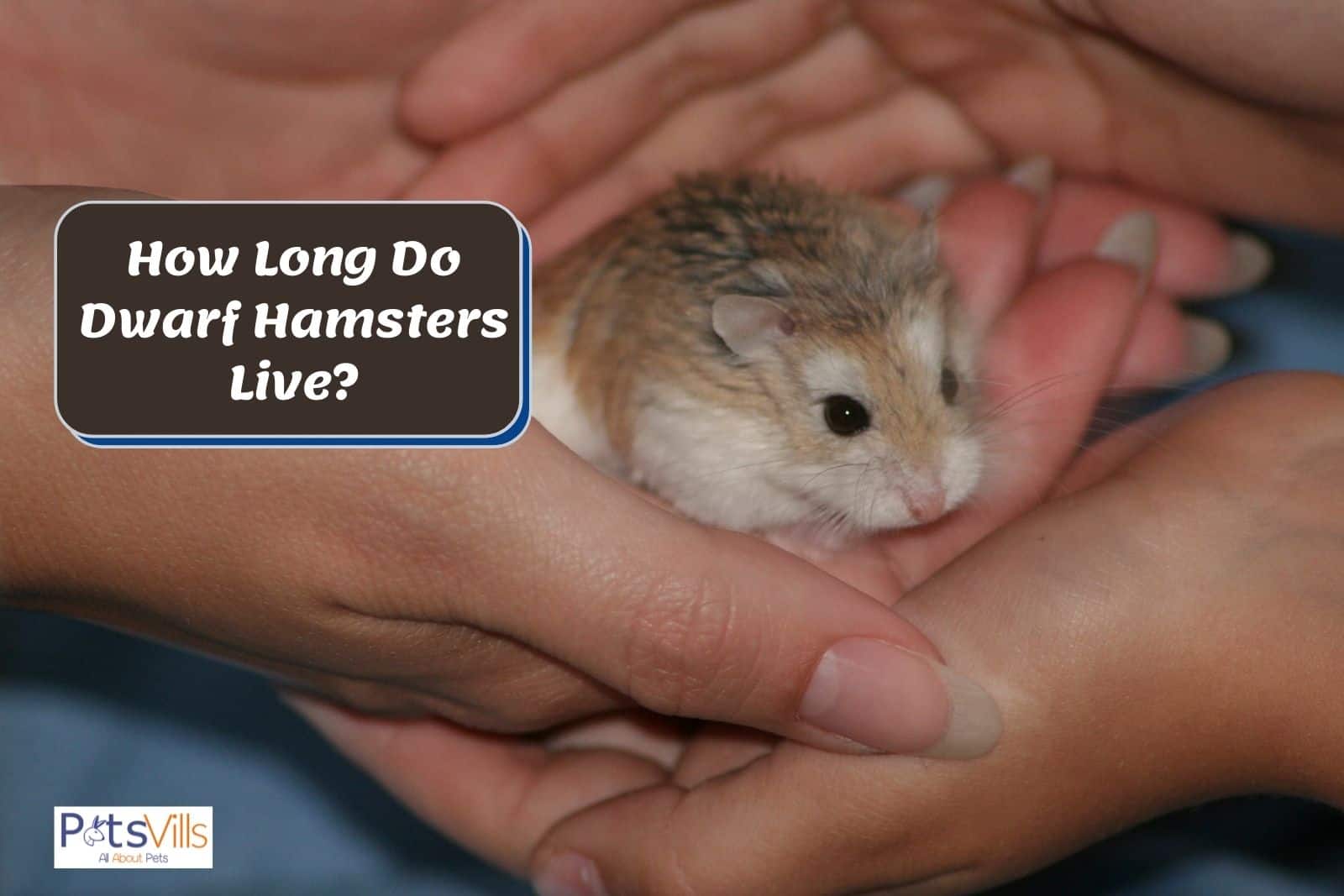How long do dwarf hamsters live, you wonder?
These tiny, lovable pets typically have a lifespan of 2 to 3 years, but with proper care and attention, they can sometimes live even longer!
As a fellow pet enthusiast, I’m thrilled to guide you through the factors that can impact their lifetimes, such as genetics, diet, and living conditions.
Together, let’s explore the delightful world of dwarf hamsters and unlock the secrets to their longevity!
Get ready to dive into the world of dwarf hamsters and their lifespans with this handy table!
| Dwarf Hamster Species | Average Lifespan (Years) |
|---|---|
| Roborovski Hamster | 3 – 3.5 |
| Campbell’s Dwarf | 2 – 2.5 |
| Winter White | 1.5 – 2 |
| Chinese Hamster | 2 – 3 |
What is a Dwarf Hamster’s Life Expectancy?
Pet dwarf hamsters have a life expectancy of 1.5 to 3.5 years, whereas wild dwarf hamsters have up to 5 years!
The life expectancy of a dwarf hamster varies by what kind of hamster it is.

Roborovski dwarf hamsters or Robos tend to live the longest, with some living up to 3.5 years.
Meanwhile, Siberian dwarf hamsters and Campbell’s dwarf hamsters only live to be about 1.5 to 2 years old.
Wild hamsters tend to live longer than hamsters in captivity [1]. These hamsters can live up to 5 years old. This is likely related to their diet and activities in the wild.
Take a look at this video to know the average lifespan of a hamster:
When hamsters are born, there can be as many as twenty. Known as pups, these animals rely on their mothers for the first 3 to 4 weeks of life.
Once they are old enough, you should separate your hamsters into their enclosures, especially if you have Syrian hamsters, who tend to fight each other.
You can often leave other hamsters together as they like social groups, but you need to separate them by sex, or you could have many babies.
Hamsters tend to reach sexual maturity between 4 and 6 weeks old, so you’ll want to separate males and females early on.
Females should not get pregnant until they are at least ten weeks old, or they might have complications like stillborn pups.
As your hamster gets over a year old, he’s starting to reach middle and old age.
During this time, the likelihood of him developing a health issue increases, so be prepared to take him to the veterinarian.
Learn more about White Winter Hamster!
Oldest Dwarf Hamster in the World (Guinness World Records)
There are mixed stories about the oldest dwarf hamster in the world. Some online reports state that the hamster lived to be seven years old.
According to the Guinness World Records, the oldest hamster lived to be 4.5 years old [2]. It was a dwarf hamster residing in the United Kingdom.
That’s not to say that your hamster couldn’t live longer. Stories abound on the internet of people with hamsters that are four years old and still going strong.
A large portion of how long they live relates to the care they get and their diet.
Curious about how long your furry friend will be by your side? Check out our article on ‘how long do hamsters live?‘ to learn more about the lifespan of these cute critters.
ALSO READ: Are Hamsters Good Pets?
How to Prolong the Life of Your Pet Dwarf Hamster
1. Your Hamster’s Diet Affects Their Overall Health
A balanced diet is crucial for your hamster’s overall health and longevity [3]. Opt for pellet mixtures over seed mixes to ensure a consistent nutrient intake, as hamsters may selectively eat certain seeds, leading to dietary deficiencies [4].

Add a variety of fresh fruits and vegetables like apples, carrots, and spinach, but avoid harmful foods like citrus, onions, raw potatoes, and uncooked beans.
CHECK: Why Do Hamsters Bleed Before They Die?
2. Make Sure Your Hamsters Cage is Big Enough
According to Dr. Lianne McLeod, a veterinarian and pet expert, providing ample living space and exercise opportunities for your hamster may increase its lifespan.
Choose a cage with appropriate wire spacing, solid flooring, and good ventilation. If you have multiple hamsters, ensure your cage is spacious enough for all. Include tunnels, multiple levels, and a separate nesting area to enrich their environment.

3. Provide Your Hamster With a Lot of Playtime

Playtime and exercise are essential to keep your hamster fit and healthy. Use a hamster wheel, or try a hamster ball for supervised exploration outside the cage.
Remember to monitor your hamster during playtime to prevent accidents or altercations with other pets.
MUST READ: How to Bond With Your Hamster?
Additional Tips for a Thriving Furry Friend
- Regular cleaning of your hamster’s cage is essential for maintaining a healthy living environment. Remove soiled bedding and uneaten food daily, and thoroughly clean the cage at least once a week.
- This will help prevent the buildup of harmful bacteria and unpleasant odors [3].
- Keep your hamster’s stress levels low by providing a consistent daily routine, minimizing loud noises and sudden movements near their cage, and handling them gently [5].
- Regular socialization can also improve your hamster’s well-being, as they are social creatures.
- Monitor your hamster’s health by regularly checking its weight, coat condition, teeth, and nails. If you notice any changes or abnormalities, consult a veterinarian experienced in small animal care.
- Supply your hamster with mentally stimulating toys, like chew toys, hiding spots, and puzzle feeders, to encourage their natural behaviors and prevent boredom [5].
- Ensure your hamster’s environment is comfortable, ideally between 65°F and 75°F, and away from direct sunlight, drafts, or heat sources [3].
For great tips on cleaning your hamster’s cage, check out this helpful video:
Health Problems That Could Affect Their Lifespan
Your hamster can be affected by many different health issues, especially if left untreated, which may affect his lifespan.
Possible issues include tooth problems, skin infections, upper respiratory infections, and diarrhea.
Dental Problems
A common health issue in hamsters is an issue with their teeth. Your hamster’s teeth are constantly growing and can grow down through his chin if they are not worn down.
You can help prevent dental issues by providing your hamster with things to chew on, such as wooden blocks.
Some pet stores even sell non-toxic houses they can live in and chew on.
If your hamster starts to have dental issues, they need to see a veterinarian, who may trim their teeth back to the length they should be.
Skin infections can be caused by improperly maintained habitats, primarily if waste builds up in the cages.
Having too many hamsters together can also increase their risk of skin problems, especially wounds due to fighting.
If your cage has sharp points, your hamster might cut himself, especially while exploring the cage’s nooks and crannies.
Inspect the cage regularly when you clean it to ensure that there don’t appear to be any issues.
Respiratory Infections
Upper respiratory infections are common among hamsters, and symptoms can include nasal or eye discharge.
You might also note your hamster sneezing or coughing.
If you start noticing any of those respiratory signs, you must get your hamster to the vet. Left untreated, an upper respiratory infection can worsen issues such as pneumonia.
Hamsters are also prone to gastrointestinal or GI problems, which commonly cause diarrhea in your hamster. Causes include bacterial infections, viruses, stress, and dietary indiscretion.
If you feed your hamster too much fresh food or protein, he might develop diarrhea. Eating too many seeds can also cause this to occur.
If you notice your hamster’s stool getting soft, he must get to the veterinarian and be evaluated. If you don’t treat him, he can develop dehydration and worsen quickly.
When you take your hamster to be examined, your vet might put him on antibiotics to treat a bacterial infection.
These are often oral medications and may treat upper respiratory infections, skin issues, and bacterial overgrowths causing diarrhea.
You must give all medications as your vet has prescribed them. Not doing so can cause a relapse in your pet or cause them to get worse.
If you want your hamster to live a long, healthy life, their housing, diet, and exercise are closely linked to their longevity.
FAQs
Do hamsters have tails?

Hamsters have short stubby tails. The length determines the breed of the hamster. Different species will have different sizes of tails.
Can hamsters climb?
Hamsters aren’t as good climbers as other rodents, such as rats, but they can climb upstairs or in their cages.
Can hamsters eat bread?

Hamsters can eat brown bread in small amounts, but it isn’t recommended. Carbohydrates are pretty fatty and contain lots of sugar. You should think carefully before adding treats like bread to your hamster’s diet.
Conclusion
In conclusion, dwarf hamsters are delightful little pets with a lifespan typically ranging from 2 to 3 years. Although their time with us may be brief, these tiny creatures can bring immense joy and companionship to our lives.
By providing your dwarf hamster with a well-balanced diet, a clean and spacious cage, and opportunities for exercise and play, as well as reducing stress and monitoring their health, you can help your furry friend enjoy a happy, healthy life.
Remember, responsible pet ownership is crucial in extending your hamster’s lifespan, so always stay informed and attentive to their needs.
As a pet enthusiast, it’s essential to cherish the time you have with your dwarf hamster and make every moment count.
After all, these little creatures have so much to offer, and the memories you create together will last a lifetime. So, are you ready to embark on an amazing journey with your tiny, whiskered companion?

How oldest dwarf hamster did you ever have? Let us know in the comments below!
Resources
- Hamster care – everything you need to know | RSPCA [Internet]. Rspca.org.uk. 2017. Available from: https://www.rspca.org.uk/adviceandwelfare/pets/rodents/hamsters
- Available from: https://www.guinnessworldrecords.com/world-records/oldest-hamster-ever#:~:text=The%20oldest%20hamster%20ever%20was,Tyne%20%26%20Wear%2C%20United%20Kingdom.
- ASPCA. (n.d.). Hamster Care. Retrieved from https://www.aspca.org/pet-care/small-pet-care/hamster-care
- Quesenberry, K. E., & Donnelly, T. M. (2012). Hamsters. In Ferrets, Rabbits, and Rodents: Clinical Medicine and Surgery (3rd ed., pp. 244-254). Elsevier Health Sciences.
- RSPCA. (n.d.). How to keep your hamster happy and healthy. Retrieved from https://www.rspca.org.uk/adviceandwelfare/pets/rodents/hamsters/environment

Andreea is a very passionate content creator and her purpose is to provide you with the most interesting articles, while constantly discovering new facts. She’s been freelance writing for the past five years and has created numerous articles and educational materials while managing her own mom blog.
Read her Latest Articles
Find her on
FACEBOOK AND Instagram


